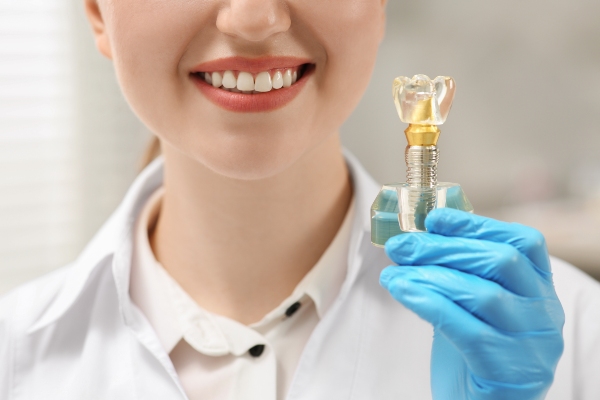Tell Your Dentist About Prescriptions Las Vegas, NV
Many people wonder whether their dentist needs to know details about their general medical history, particularly when it comes to their prescription medications. It can feel intimidating to open up to a dentist about personal information. Still, a complete health dentist integrates information about your overall health to provide you with the best oral care, so it is important to strive for transparency.
For more information about the comprehensive care provided by complete health dentists, our team at Hybrid Dental in Las Vegas is here to help. Call us at (702) 628-5807 to learn more.
Heart Conditions
A primary dental provider should be aware of all conditions, medications, and prior treatments of their patients, especially those for more serious problems, such as heart disease. According to The Academy of General Dentistry, "the most common cause of drug-related interactions is the doctor's lack of information about your medical history." It is important to relay all medical conditions, medical history, medications, supplements, vitamins, allergies, and any adverse reactions that result from medications or treatments.
Despite oral hygiene's positive effect on the heart, patients with heart conditions may be ineligible for certain dental procedures. Invasive dental procedures, such as periodontal treatment, may increase the risk of heart attacks and strokes. Some procedures boost inflammation in the body as it responds to bacteria entering the bloodstream after surgery. If the treatment is more detrimental than the condition itself and poses the risk of ineligibility, then a complete health dentist can weigh the circumstances and offer alternatives.
“Despite oral hygiene’s positive effect on the heart, patients with heart conditions may be ineligible for certain dental procedures.”
Procedures Prevented by Certain Medications
A patient's medical history is not the only factor that can impact their eligibility for certain dental procedures. Their prescription medications can also necessitate special planning or avoidance of certain dental procedures. For example, if patients are taking certain medicines that thin their blood, also known as anticoagulants, they should make sure to inform their dentist before any procedures.
Another example of medications that can impact dental care is the medication class of bisphosphonates used to treat osteoporosis. Rarely, bisphosphonates can cause serious dental complications, so patients' primary dental care provider must be aware of this medication so that they can sufficiently monitor their status.
“… prescription medications can also necessitate special planning or avoidance of certain dental procedures.”
Mixing Dental and Medical Prescriptions
Many adverse reactions occur due to drug interactions between medical and dental medications, especially when providers are unaware of a patient's history or present prescriptions. Since most drug interactions are harmful or even deadly, primary care providers and complete health dentists understand which medications to prescribe when coupled with prescriptions for other medicines.
Patients must set aside their personal wishes for treatment when more serious conditions require ongoing medication that may interfere with dental procedures. A study on common dental drug interactions finds that "a thorough medical and drug history of all prescription, OTC, and herbal products must be taken and documented and reviewed at every dental visit." This prevents adverse reactions, doubling symptoms, and fatal risks from occurring and allows dentists to be proactive in finding alternative measures.
“Patients must set aside their personal wishes for treatment when more serious conditions require ongoing medication that may interfere with dental procedures.”
Check out what others are saying about our dental services on Yelp: Tell Your Dentist About Prescriptions in Las Vegas, NV
How a Dentist Can Alter Treatment Depending on a Prescription
If patients are taking a prescription medication that they think may interfere with a dental procedure or with their dental treatment otherwise, there is no reason to worry. As long as patients provide this information to their dentist, many workarounds are available to ensure that patients receive high-quality, evidence-based oral care.
Depending on the nature of the patient's prescription, their dentist may need to adjust their dose, have patients stop taking the medication for some time (in coordination with their prescribing physician), or do a blood test before they can proceed with dental care. Complete health dentists are skilled in evaluating and treating the patient as a whole, eyeing the oral-systemic link. They know how to modify treatment plans according to their personal medical profile appropriately.
“Complete health dentists are skilled in evaluating and treating the patient as a whole, eyeing the oral-systemic link.”
Questions Answered on This Page
Q. Why are patients with heart conditions ineligible for many dental procedures?
Q. How can combining medications affect certain medical conditions?
Q. What medicines can interfere with dental procedures?
Q. What happens if I am taking a prescription that interferes with my dental care?
People Also Ask
Q. How is diabetes affected by oral hygiene?
Q. How can I find out if my employer's plan covers dental treatments?
Q. What are some of the reasons one might need a tooth extraction?
Frequently Asked Questions About Opening Up to Your Dentist
Q. How do dentists treat patients with heart valve conditions?
A. First, your dentist will ask questions about the nature of the heart condition, including any medications and procedural history. After reviewing this information and potentially coordinating with your medical doctor, the dentist may prescribe you an antibiotic before the procedure to lower their risk of developing a heart infection known as infective endocarditis.
Q. Will a dentist prescribe an antibiotic if I have had a joint replacement?
A. Most likely, no. According to the American Dental Association, the most current guidelines recommend against prophylactic antibiotics (antibiotics taken before a procedure) in patients who have prosthetic joint implants.
Q. What other conditions or prescriptions are important for my dentist to know about?
A. In general, your dentist should know about all of your prescription medications because even if a prescription may not seem related to their oral health, it may interact with medications used by a dentist. For example, as reviewed previously, cardiac medications, anticoagulants, and medications for osteoporosis can affect their dental treatments. Additionally, their dentist will want to know about any history of organ transplants, biological implants, or chemotherapy.
Q. Can taking or not taking my prescription medications affect my mouth?
A. Some patients are, in fact, taking medications that may be negatively impacting their mouth. At the same time, not taking prescribed medications can also affect your oral health. Do not stop taking prescription medicines on your own discretion. In most cases, a physician and dentist will tell you what medication you are being prescribed and its benefits, as well as the risks it carries. Patients who feel their oral health is being affected should communicate that with both their dentist and doctor to try and alter the medication.
Q. Are there alternative dental treatments for patients currently taking interactive medications?
A. Almost all dental treatments have alternative treatments that can be done for patients with certain medical conditions or who are taking certain medications. If the particular treatment does not have alternatives, we may alter the treatment or, when absolutely necessary, speak to the patient's doctor about altering the medication or stopping it for a short period, if possible. Since each treatment differs and has differing levels of necessity, we will discuss the available options with the patients.
Dental Terminology
Learn More Today
If you are interested in better understanding complete health dentistry and why patient-provider rapport is important, call us at 702-628-5807 to set up an appointment.
Helpful Related Links
- American Dental Association (ADA). Glossary of Dental Clinical Terms. 2024
About our business and website security
- Hybrid Dental was established in 2012.
- We accept the following payment methods: American Express, Cash, Check, Discover, MasterCard, and Visa
- We serve patients from the following counties: Clark County and Nye County
- We serve patients from the following cities: Las Vegas, Summerlin, North Las Vegas, Spring Valley, Paradise, Henderson, Centennial Hills, Mt Charleston, Enterprise and Pahrump
- National Provider Identifier Database (1306143847). View NPI Registry Information
- Healthgrades. View Background Information and Reviews
- Norton Safe Web. View Details
- Trend Micro Site Safety Center. View Details
Back to top of Tell Your Dentist About Prescriptions










